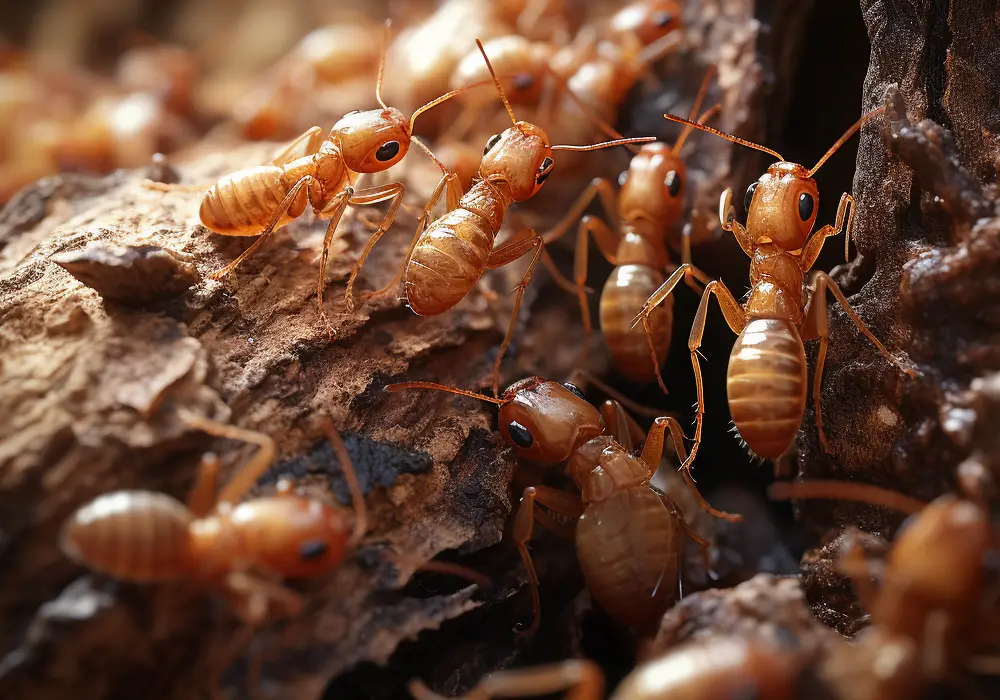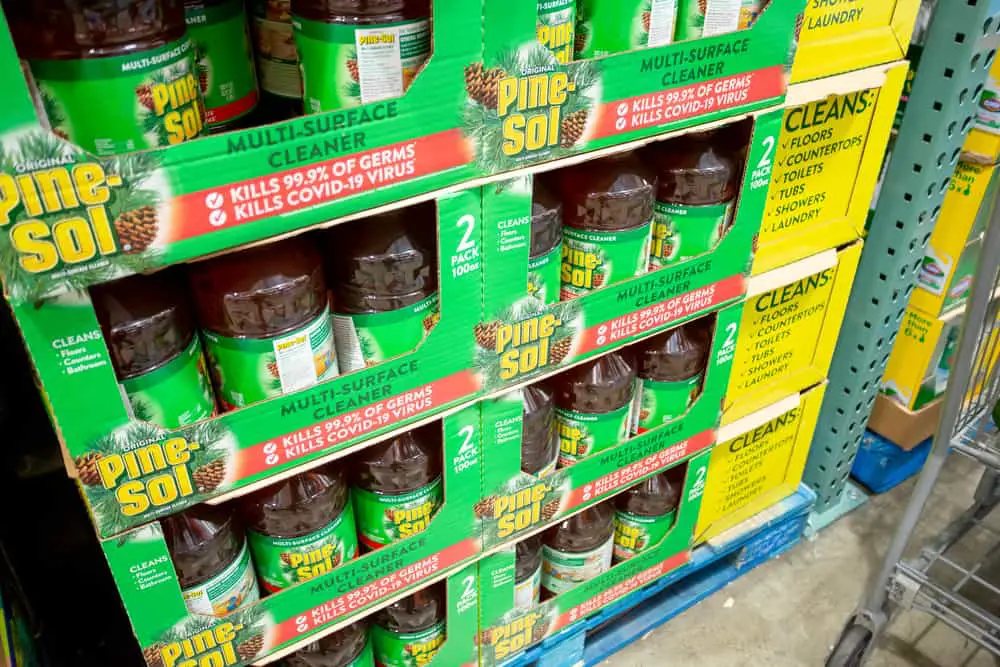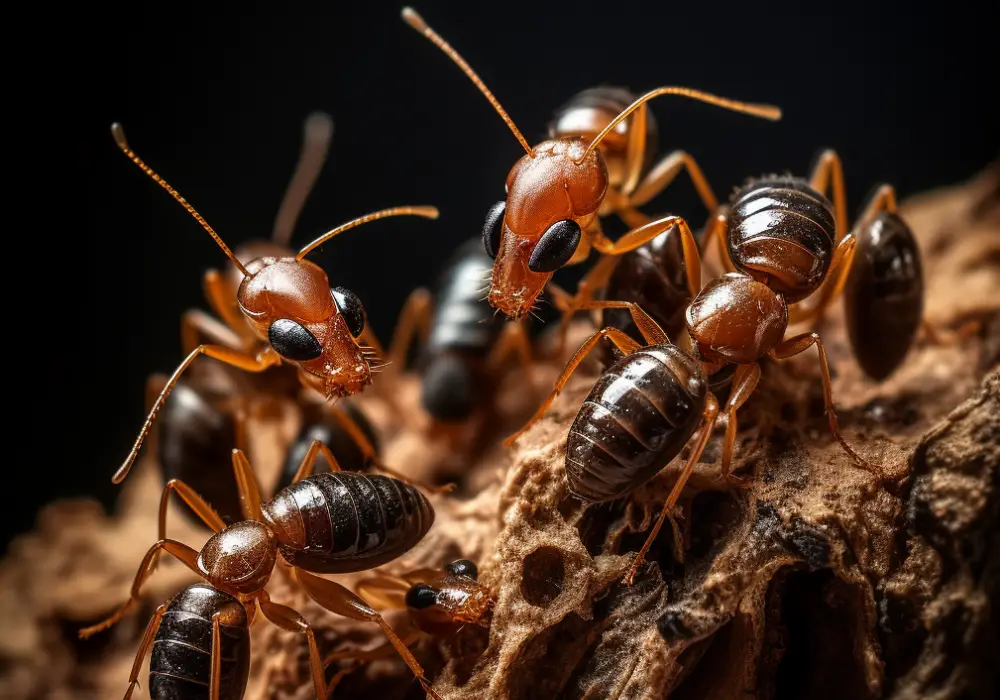Termites are a notorious household pest infamous for causing costly property damage. To combat these resilient insects, homeowners are often in search of effective and convenient methods to eliminate them.
Alcohol, specifically rubbing alcohol or isopropyl alcohol, has been known to exhibit some insecticidal properties. Its application as an easily accessible and affordable solution has made some individuals consider it for termite control.
Quick Answer:
Yes, alcohol can kill termites by dehydrating them. However, it’s not a practical solution for termite infestations, as it won’t reach deep within wood structures. Professional treatments or specific insecticides are typically more effective.
In this article, we will explore the science behind alcohol’s impact on termites and discuss its viability as a termite control method.
Understanding Termites and Their Behavior
Termites are social insects that primarily feed on wood and other materials containing cellulose. They are known to cause significant damage to wooden structures, with a high likelihood of leading to a termite infestation if left untreated.
There are two main types of termites: subterranean termites and drywood termites. Subterranean termites live in colonies underground and build tunnels to reach their food sources, while drywood termites create nests within the wood itself.
Both species are capable of causing extensive damage to wooden structures.
A termite swarm occurs when winged termites, also known as swarmers, leave their colonies to mate and establish new nests.
Discarded wings can often be found near windows and doors following a swarm, which may indicate the presence of a termite problem. In addition to discarded wings, other signs of a termite infestation include termite droppings, hollow wood, and mud tubes.
Termites have the ability to break down cellulose in wood through the enzymes in their digestive systems, making them highly efficient at consuming wooden materials. As a result, a termite population can grow rapidly and cause significant structural damage if left unchecked.
How Alcohol Affects Termites
Alcohol, particularly rubbing alcohol or isopropyl alcohol, has been found to be effective in eliminating termites. When termites come into contact with alcohol, it can penetrate their exoskeleton and cause damage to their nervous system.
The high alcohol content in rubbing alcohol interrupts normal functioning of the termite’s nervous system, leading to paralysis or even death.
Isopropyl alcohol and other forms of alcohol not only impacts the nervous system but also causes dehydration in termites. The alcohol evaporates quickly, drawing out the moisture from the termite’s body, which ultimately leads to its death due to dehydration.
This is an important factor, as termites require a certain level of moisture to survive and develop their colonies.
Applying alcohol directly to a termite-infested area can potentially eliminate a significant number of termites. However, it may not completely eradicate an entire colony, as it only targets termites it comes into direct contact with.
This means that alcohol may not reach those deeper within the colony or those located in hard-to-reach areas.
Besides its efficacy in killing termites, isopropyl alcohol poses minimal risk to human health as long as it is used with proper care and precautions. While applying alcohol directly to termites, it is essential to protect your skin and eyes from potential irritation or damage.
Effectiveness of Alcohol in Termite Control
Alcohol can be considered as an option for termite control, especially in DIY methods. A common type of alcohol used is isopropyl alcohol, which can be found in many households as rubbing alcohol.
While alcohol is not as effective as professional treatments, it can be a temporary solution for small infestations.
When using alcohol for termite control, it is mixed with water in a spray bottle and directly applied to the infested area. Alcohol works by disrupting the termites’ exoskeleton and dehydrating them, leading to their death.
It is important to note that alcohol may not penetrate deep into the wood, so it may not work for all types of termite infestations.
While using alcohol is an inexpensive and readily available option for homeowners, it may not be enough to get rid of termites entirely. In these cases, professional treatments are recommended to ensure complete eradication of termites.
Professional termite treatments often involve specialized chemicals and tools that can effectively penetrate deep into the wood and kill entire colonies.
In addition to alcohol, there are other natural methods for killing termites, such as using diatomaceous earth or boric acid. However, these methods also have limitations in their effectiveness. For long-term termite control, it is always better to seek the help of a professional exterminator.
Using Alcohol as a Termite Control Method

Termites can wreak havoc on your home and property, causing costly damage to wooden structures. If you face termite infestations, you may want to consider using alcohol as a control method.
Rubbing alcohol, or isopropyl alcohol, is a readily available and relatively safe option for homeowners to incorporate into their pest control efforts.
To use rubbing alcohol for termite control, mix equal parts of alcohol and water in a spray bottle. This diluted solution is effective against termites, as the alcohol penetrates their exoskeleton and evaporates, dehydrating and ultimately killing them.
Make sure to target the areas where termites are most likely to be found, such as wood surfaces, cracks, and crevices.
In addition to directly killing termites, alcohol acts as a deterrent to prevent further infestations. Termites are highly sensitive to chemical changes in their environment, and the presence of alcohol can disrupt their communication and navigation.
While alcohol may appear to be an effective and convenient method for termite control, it is important to remember that it is only a temporary solution.
Rubbing alcohol will not reach into the termite colonies deep within the wooden structures, so it might not be enough to eliminate an entire infestation. Moreover, alcohol is highly flammable, so exercise caution when using it around your home.
Safety Precautions When Using Alcohol
Alcohol, specifically isopropyl alcohol, can be an effective method for killing termites.
However, there are important safety precautions to keep in mind when using this method.
1. Flammability: Isopropyl alcohol is highly flammable, and its vapors can easily ignite. Avoid using it near open flames, sparks, or any heat sources. Ensure proper ventilation in the area where the alcohol will be used to minimize the risk of fumes catching fire. Keep a fire extinguisher accessible in case of emergency.
2. Toxicity: While isopropyl alcohol can be effective against termites, it may also be harmful to humans and other living organisms. Use protective gloves and eyewear when handling the alcohol, and avoid ingesting or inhaling the substance. If accidental exposure occurs, seek medical attention immediately.
3. Environmental Concerns: It is essential to consider the potential impact on the environment when using alcohol as a method for termite control. If alcohol reaches water sources such as streams or ponds, it can damage the aquatic ecosystem. Be mindful of the surrounding area and dispose of any used alcohol appropriately to limit the risk of environmental damage.
4. Selective Application: When using alcohol for termite control, it’s crucial to apply the solution directly to the termites and their nests or galleries. Avoid spraying alcohol indiscriminately, as this can increase the risk of exposure to people, pets, and other wildlife.
Other Household Products For Termite Control

Vinegar, which contains acetic acid, can be used as a termite repellent. By mixing a solution of equal parts water and vinegar, you can spray it directly on termite-infested areas to deter them.
However, its effectiveness may vary, and it is not a long-term solution.
Borax, also known as sodium borate, offers a more potent solution for termite control. You can apply it as a powder or dissolve it in water to create a spray. Its toxic properties specifically target the termite’s digestive system, making it a powerful solution against termite infestations.
Though bleach is commonly found in households, it is not an ideal termite control method. It may kill some termites on contact, but it is not effective for long-term control or preventing future infestations.
Lime, Epsom salt, and salt may be used as barriers to deter termites. These substances can be sprinkled around the foundation of your home to create an unfavorable environment for termites.
However, their effectiveness as a termite control method is limited and should not be solely relied upon.
Pine-Sol and soapy water can be helpful for termite control but only to a certain extent. These solutions can kill termites they come in direct contact with but do not offer long-term protection.
Lemon juice and apple cider vinegar are often recommended as natural termite control remedies. These acidic substances can deter termites but may not be as effective or long-lasting as other professional termite control treatments.
Finally, some disinfectants can provide a temporary solution for eliminating termites. However, they are not specifically formulated for termite control and may not be as effective as other dedicated products.
Non-Chemical Termite Control Methods
Implementing non-chemical termite control methods can be an effective way to protect your property from these pests. Prevention is key in these strategies, and there are several measures you can take to deter termites from invading your home.
Firstly, it’s essential to eliminate termite access points such as mud tubes. Mud tubes are pathways termites use to travel from their nest to your home’s foundation. Regularly inspect your foundation, doors, windows, and vents, sealing any cracks and gaps that can provide entry points.
Maintaining proper drainage around your home is also crucial, as termites thrive in moist environments. Fix any leaks in pipes and make sure there’s no standing water near your home’s foundation.
In addition to sealing entry points, you should remove food sources for termites. Keep firewood, plants, and trees at least a few feet away from your home. This will create a buffer zone that termites will be reluctant to cross. It’s also essential to remove any dead wood or plant debris from your property.
Physical barriers can help prevent termites from entering your home. For instance, you can install screens on windows and vents to block their entry. Metal termite shields, such as those made from stainless steel or aluminum, can be fitted around the foundation of your home to block termite access.
Baits can also be used as a non-chemical termite control method. Baits contain an enticing food source, such as cellulose, which attracts termites. Once consumed by the termites, the bait slowly kills them, preventing them from reproducing and eventually eliminating the colony.
Place baits around your home’s perimeter, especially near known termite activity areas.
Another non-chemical control method is the introduction of nematodes. These are tiny, worm-like organisms that prey on termites and can reduce their population naturally. You can purchase nematodes from a garden center or online and release them into the soil near your home.
Finally, consider using non-chemical termite repellents around your home to deter termites. Examples of such repellents include Thermidor foam, which can be applied to wall voids, and other natural substances like orange oil, which can deter termites from approaching your home.
Professional Termite Control Methods
There are several effective professional termite control methods available to help manage and eliminate termite infestations.
These techniques primarily rely on the use of specialized insecticides called termiticides, along with baits and bait stations, to tackle termite colonies.
Chemical treatments are a common option for termite control, involving the use of liquid termiticides. Pest control professionals from companies like Orkin may apply these chemicals to the soil surrounding a property, creating a barrier that termites cannot cross without being exposed to the active ingredients.
Fipronil and imidacloprid are two popular active ingredients used in liquid termiticides, offering strong and effective protection against termite damage.
Baiting systems are another popular method for professional termite control. In this approach, bait stations are strategically placed around a property to attract and kill termites.
The bait generally consists of a slow-acting insecticide, which enables termites to consume the toxic material, share it with other colony members, and kill the entire colony over time. Hexaflumuron is a common active ingredient in termite baits.
Diatomaceous earth is a natural and non-toxic substance used by some professional pest control services to control termites. This fine powder is made from the fossilized remains of microscopic algae called diatoms, which can effectively dehydrate termites upon contact.
While this method is generally considered less powerful than chemical treatments, it can serve as an eco-friendly alternative or supplement to other termite control methods.
Boric acid is another substance used by professionals for termite control. It can be applied as a powder or mixed with paint to create a long-lasting, protective barrier against termites.
When termites come in contact with the boric acid, it works by disrupting their digestive systems, ultimately leading to their death. However, it’s best when used as a preventive measure rather than a standalone treatment for active infestations.
Signs of Termite Infestations
Termites can cause extensive damage to your property if left unchecked. Spotting a termite infestation early is vital in preventing further harm. Here are some common signs to look for when identifying a termite problem:
Mud tubes: Termites create mud tubes to protect themselves from predators and to maintain a moist environment. Look for these tubes near the foundation of your home, as they could indicate a termite infestation.
Discarded wings: Winged termites, also known as swarmers, shed their wings after finding a suitable location to establish a new colony. If you notice discarded wings near windows, doors, vents, or cracks, it may be a sign of a termite problem.
Termite droppings: Also known as frass, termite droppings are small, wood-colored pellets. They can often be found in piles near termite-infested wood.
Hollow wood: Termites consume cellulose, which is found in wood and other plant materials. If you notice your wooden structures sound hollow when tapped, it could be a sign of termite damage.
Cracks in windows and doors: Termites need an entry point to invade your home. Cracks around windows and doors can provide access, so keep an eye out for any gaps or damage.
Preventing Future Termite Infestations
Preventing termite infestations is crucial for maintaining the structural integrity of your home or building. One way to prevent termites is by taking care of the foundation.
Make sure to inspect the foundation regularly for cracks and crevices, as these can be entry points for subterranean termites. If you find any cracks, seal them up to avoid attracting unwanted pests.
Ensure proper drainage around your property by fixing leaks and diverting water away from the foundation. This reduces moisture levels, which can attract termites. It is also beneficial to install vents around your building to help maintain proper airflow and reduce humidity.
Physical barriers are another effective termite prevention method. These can include metal shields or chemical treatments to deter termites from entering your home. It’s essential to have pest control professionals install physical barriers to guarantee correct application and effectiveness.
Using termite baits is a popular do-it-yourself method of termite control. Baits include slow-acting insecticides that termites take back to their colonies and gradually reduce their population. Make sure to carefully follow the instructions on the bait package to ensure maximum effectiveness.
Taking precautions around windows and doors can also help prevent termites. Make sure there are no gaps left around window and door frames where termites could potentially enter your home. Seal any gaps or cracks to limit their access.
Firewood and tree trimmings are great sources of food for termites, so avoid stacking these materials directly against your home or on the ground. Place firewood on a raised platform and keep trees well-trimmed, ensuring that their branches do not touch your building.
A well-maintained landscape can also help keep termites at bay. Remove old tree stumps and evaluate trees for termite damage or signs of an infestation. Additionally, use termite repellent treatments on trees and shrubs to protect them from termite damage.


